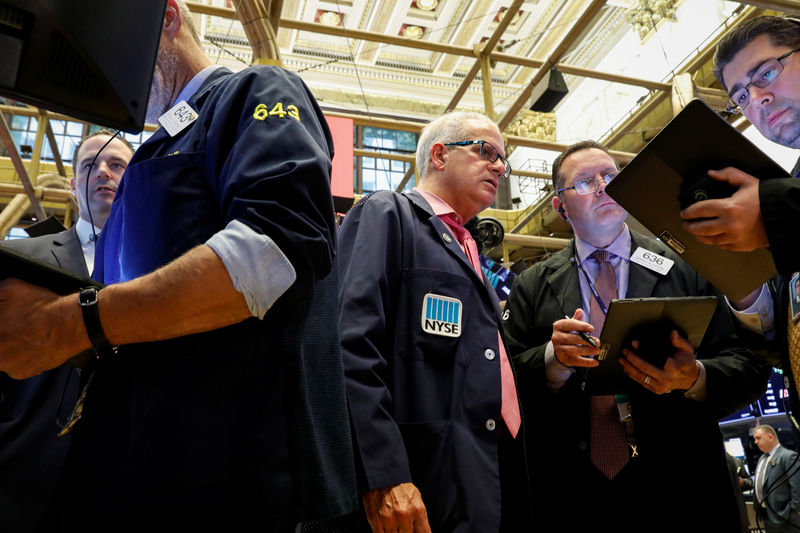By Herbert Lash
NEW YORK (Reuters) - World equity markets surged and crude oil prices jumped on Friday after a stronger-than-expected U.S. employment report, a surprise bounce in Chinese manufacturing and optimism over U.S.-China trade talks tamped down fears of slowing global growth.
Equity markets in Europe and across the Americas rallied, with the S&P 500 and Nasdaq hitting closing record highs and MSCI's gauge of equity performance across the globe rising to within 2.1% of its all-time peaks set in January 2018.
The strong U.S. and Chinese data and remarks that an initial trade pact with China was near pushed up the price of oil, overshadowing a Reuters survey that showed crude prices are expected to remain under pressure through next year.
U.S. and Chinese negotiators had made "enormous progress" toward reaching a "phase one" agreement, though the deal was not yet 100% complete, White House economic adviser Larry Kudlow told reporters.
U.S. job growth slowed less than expected in October as the drag from a strike at General Motors (N:GM) was offset by gains elsewhere and hiring in the prior two months was stronger than previously estimated, data from the Labor Department showed.
"This report isn't weak enough to signal caution or a recession on the horizon," said Michael Arone, chief investment strategist at State Street (NYSE:STT) Global Advisors in Boston.
"But the jobs market still isn't strong enough to suggest that the Fed or other central banks should be tightening interest rates. Investors like that dynamic," he said.
The data should allay concerns about the health of the U.S. consumer in the fourth quarter, said Yousef Abbasi, global market strategist at INTL FCStone Financial Inc in New York.
"The numbers were better than expected; this bodes well for the broader economy," Abbasi said, referring to the jobs report.
In China, the Caixin/Markit Manufacturing Purchasing Managers' Index for October rose to 51.7 from 51.4 the prior month, marking the third straight month of expansion. Economists had expected a dip in growth to 51.0.
The data lifted Chinese blue chips (CSI300), which jumped 1.7% in their best day since mid-August. Seoul's Kospi (KS11) rose 0.8% and Hong Kong's Hang Seng (HSI) added 0.7% on news of the manufacturing report.
MSCI's gauge of stock performance in 47 countries (MIWD00000PUS) rose 0.81%, while the pan-European STOXX 600 index (STOXX) closed up 0.68%.
On Bay Street in Toronto, the TSX composite index (GSPTSE) gained 0.67%, while in Mexico the Bolsa index (MXX) rose 1.1% and in Brazil the Bovespa (BVSP) climbed 0.91%.
The S&P rose for the fourth straight week, its longest streak since February, while the Nasdaq has gained the past five weeks. Quarterly earnings have come in stronger than anticipated and U.S.-China trade rhetoric has appeared to be productive.
On Wall Street, the Dow Jones Industrial Average (DJI) rose 301.13 points, or 1.11%, to 27,347.36. The S&P 500 (SPX) gained 29.35 points, or 0.97%, to 3,066.91 and the Nasdaq Composite (IXIC) added 94.04 points, or 1.13%, to 8,386.40.
For the week, the Dow rose 1.44%, the S&P 500 climbed 1.47% and the Nasdaq rose 1.74%, spurred by corporate earnings.
About 76% of the 356 S&P 500 companies that have reported so far have beaten profit estimates, according to Refinitiv data.
U.S.-China trade tensions have slowed global growth and weighed on investor sentiment, with economic data showing slowing manufacturing output.
The U.S. economy's manufacturing sector contracted for a third straight month in October but at a slower pace than the previous month, an index from the Institute for Supply Management showed.
Both Brent, the global benchmark, and U.S. benchmark West Texas Intermediate jumped more than 3%.
Brent crude (LCOc1) rose $2.07 to settle at $61.69 a barrel, while WTI crude (CLc1) settled up $2.02 at $56.20 a barrel.
The dollar slid as optimism that the United States and China will reach a deal to end their trade war reduced safe-haven demand for the greenback.
The dollar index (DXY) fell 0.13%, with the euro (EUR=) up 0.11% to $1.1162. The Japanese yen
Yields on U.S. government bonds rose after the jobs numbers but later pared some of the gains after the Institute for Supply Management's manufacturing indexes were weaker than forecast.
The benchmark 10-year U.S. Treasury note (US10YT=RR) fell 8/32 in price to push its yield up to 1.719%.
Euro zone government bond yields pushed higher on the economic signals from U.S. data and Christine Lagarde began her presidency of the European Central Bank.
Most 10-year bond yields in the bloc rose around 2 basis points on the day after striking two-week lows on Thursday.
Germany's 10-year Bund yield was at -0.38% (DE10YT=RR).
Gold prices eased as the better-than-expected U.S. employment report and strong factory data from China bolstered sentiment for riskier assets.

Spot gold